The CGIAR Research Program on Water, Land and Ecosystems (WLE), would like to engage partners and readers of the Agriculture and Ecosystems Blog in a debate on how we unite agricultural production, poverty reduction and environmental sustainability. To start the debate, Andrew Noble, Program Director for WLE, explains why we need a farming revolution, and suggests smallholder farmers will play a vital role in delivering agricultural change in the coming years. We invite partners and colleagues working in similar areas to comment or write blogs in response. Please send blogs to a.waldorf(at)cgiar.org.
A new green revolution must intensify farming sustainably
Two billion small-scale farmers hold the key to feeding the world’s growing population while reversing past environmental damage. At present, the families and domestic markets supplied by such rural farmers constitute 70 per cent of global food consumption. Intensifying agriculture in a sustainable way that meets future food demands will require us to improve the resilience of these farmers to climate variation, ensure there are institutions and policies to support them, nurture the ecosystem services that underpin the production of healthy crops and address gender inequalities.
Over the past 50 years, agricultural scientists have made tremendous progress in securing food for the majority of people who inhabit the planet. They have largely achieved this by advancing our knowledge of the optimal conditions in which to grow crops productively and by generating high-yielding seed varieties. In doing so they have increased global staple food production by 355% and raised global food productivity (yield/unit area) by 301%. Thanks to these efforts, we are close to achieving the Millennium Development Goal of halving the number of people suffering from hunger between 1990 and 2015.
Such success, however, has come at a tremendous cost. Our current way of practicing agriculture has been described as the dominant force behind many of the environmental threats we now face, including climate change, biodiversity loss, and the degradation of land and freshwater. Our disregard for nurturing the environment has contributed to moving us beyond the ‘‘planetary boundaries’’ that are critical to ensuring stability within the Earth’s systems, jeopardizing the future of humanity. (See Planetary boundaries Part I: Defining a safe operating space for human existence by Professor Johan Rockström.)
Two dominant processes have led to these impacts. First, the lateral expansion of crop and pasture lands has displaced natural ecosystems. This has resulted in biodiversity and habitat loss, plus increased greenhouse gas emissions associated with land clearing. Meanwhile, the loss of soil carbon has prompted a decline in ecosystems services. Second, the unsustainable intensification of production systems, predicated on fossil fuels, focused on greater output through the inappropriate use of fertilizers, irrigation, biocides and mechanization. This caused additional greenhouse gas emissions and environmental degradation.
Addressing the dual challenges of how to ensure food security and safeguard a stable planet, will require a new approach to how we plan and implement agricultural development. We will have to shift away from our current focus of enhancing productivity with little regard to environmental impacts, to one where sustainable management and governance of ecosystems, natural resources and Earth system processes at large, underpin practical solutions to intensification. The world’s two billion small-scale farmers will be the pioneers called upon to deliver this vital change.
Charting a new course for agriculture development
The CGIAR Research Program on Water, Land and Ecosystems (WLE) explores the best ways in which to help rural farmers, governments and the private sector achieve this aim. WLE complements and builds upon other CGIAR research programs, and a host of partners’ experiences, to view agricultural development from a wider perspective. WLE does this through three interlinked thematic areas. These are:
- Ensuring we use resources efficiently so as to promote long-term sustainability with limited environmental impact;
- Restoring the productive capacity of degraded rainfed and irrigated agricultural landscapes by strengthening ecosystem services and laying the foundations for sustainable agricultural intensification; and
- Reducing risk and uncertainty associated with rainfed and irrigated landscapes by facilitating the sustainable management of land and water resources.
Implicit in each of these principles are the roles men, women and young people play in using, managing and governing land and water resources, together with associated institutional and political frameworks. If we are to meet future goals for minimizing hunger, poverty, inequity and environmental damage, we must make sustainable agricultural intensification the cornerstone of our agricultural systems. This requires us to radically shift our mindset and view our agricultural production systems as wholly owned subsidiaries of the ecosystems and natural capital on which they depend.
The question we face is how do we make the transformation required to shape this new agricultural landscape? We hope to answer this question over the coming weeks, through your participation and insights, as we focus on ecosystems and their associated services.



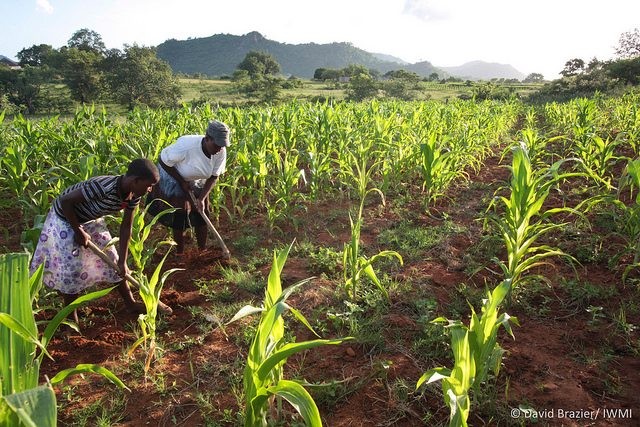
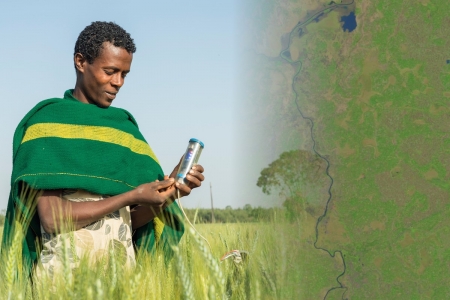


/index.jpg?itok=EzuBHOXY&c=feafd7f5ab7d60c363652d23929d0aee)


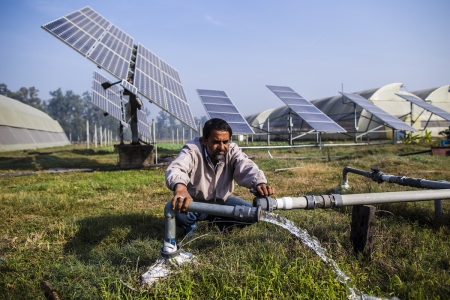

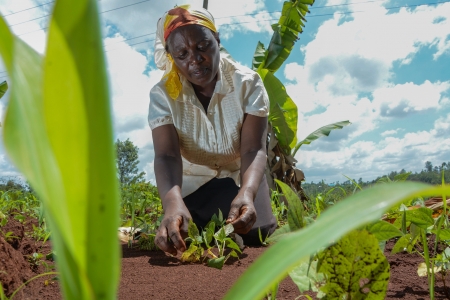





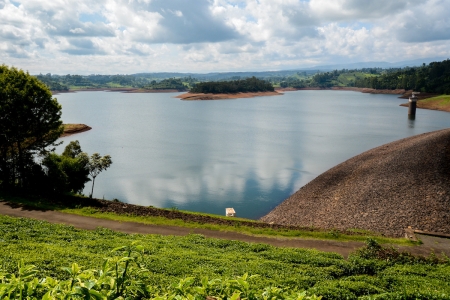
Comments
A very thoughtful blog post, Andrew. If you haven't seen it already, you might be interested in the latest report from the Montpellier Panel of experts called "Sustainable Intensification: A New Paradigm for African Agriculture" viewable at the link below.
It outlines three main pathways for smallholder-centred intensification: 1) ecological 2) genetic and 3) socio-economic. It also touches on many of the points you make here, for instance, agriculture's potential to build natural capital (rather than simply focusing on reducing its negative impacts).
https://www3.imperial.ac.uk/africanagriculturaldevelopment/themontpellier...
Thanks Michael for these positive comments and I will certainly read the report. Your comment on building natural capital is key to this whole question sustainable intensification. We should see our transformed agricultural production systems as a signficant part of the solution in ensuring that we stay within the safe operating space of the Earths Systems. Enhancing and building natural capital will be paramount.
Andrew's blog post is an excellent starting point for the discussion for a qualitatively new agricultural development. I understand the important question he poses in the last paragraph includes both the nature of the new agricultural lanscape and the ways to arrive to it.
Interesting discussion - and the issues are critical to agricultural development. We have been working in rural villages for the past 14 years and have identified the absolute necessity that small scale production must be part of an integrated system if it is to be sustainable and have the required impact. We have developed an 'Integrated Village Renewal Programme". Which looks at a wide range of services/requirements with agriculture forming the cornerstone for development.
Will see if I can post the executive summary of the plan which was finalized in 2008 and which we are currently implementing
Thanks Rosemary for your comment and we would value your insights into the approach that you are implementing at a village level. I agree that smallscale agriculture is part of the solution in addressing endemic poverty in a rural setting. Key to this is the sustainability element that is contingent on improving and maintaining natural capital. It would be great to get examples of just that, where sustainabilty and ecosystem services are being achieved.
very interesting, please feel free to post your program . thanks
very interesting post. please feel free to post your program here. i work with an ngo here in p.i. we are searching for ways in helping our farmers here . thanks
The Food Climate Research Network (FCRN) and the Oxford Martin Programme on the Future of Food, UK, have jointly published a report entitled: 'Sustainable intensification in agriculture: Navigating a course through competing food system priorities'.
Based on discussions held at a workshop in 2012, the report tries to map the concepts behind the idea of ‘sustainable intensification’ (SI) and to identify areas where further work is needed. Ultimately, the report argues the case for a more ‘systems’ oriented approach to decision making. Following the release of the report, around 30 experts in this field, from academic, governmental, NGO and industrial organisations, were asked to give their comments on the report. More recently, a paper was published on the subject.
https://www.fcrn.org.uk/fcrn/publications/sustainable-intensification-agr...
and
https://www.futureoffood.ox.ac.uk/news/sustainable-intensification-agricu...
(FCRN and Future of Food, 04/07/2013)
The neologism still struggles with practicability. A respected authority needs to set the definition straight so we know where to stand. And in a very near future too, before we get confused and discredit this interesting notion.
Interesting facts here. Having efforts redirected towards sustainable intensification with a keen eye on the ecological set up makes sense but i also like the component of small scale production being part and parcel of the the entire integrated system as Rosemary rightly put it.
I would also love to learn more about the "Integrated Village Renewal Programme" .
Thanks Cedric for your considered comments and reference to the report and Science paper both of which I have read and would encourage others. They do provide clear guidelines to what is meant by the term sustainable intensification. You do raise the issue of practicality which is paramount in this transformation and this is where there will be a need to consider trade-offs that may require a degree of compromise.
This is an interesting blog post, Andrew. In my view, the transformation to sustainable intensification for small-scale farmers requires market mechanisms and incentives that ensure farmer buy-in. Thus public and private agencies should plan and implement approaches such as agro-forestry and conservation farming (lead to higher farm productivity) and link these to profitable markets. This can translate into higher incomes that trickle down to small-scale farmers while enhancing long-term ecosystem integrity through sustainable land-use practices.
Thanks Muleda for your input, it is much appreciated. You are absolutely correct in highlighting the importance of acccess to markets and a holistic approach to sustainable intensification.The role of the public and private sectors is paramount in this transformation, particularly as we are attempting to improve the livelihoods of those that are least able to make the investments need to bring this about.
Its my honor to share my insights on Importance of having a second green revolution.
Since the global population is on the rise and all set to cross 9 billion mark by 2025, so not many people would negate the importance of finding new ways to produce enough food to feed the world.
I believe the second green revolution is actually a kind of gene revolution led by gene technolgy where we could produce more food crops on limited land. Furthermore by doing that we can add nutritious value of staple food crops including wheat, rice, maize etc.
As Dr. Borlaug also suggested the advent of gene revolution and higlighted its importance on numerous accasions so its of utmost importance to see where and how this technology could help benefit the mankind.
Kaleem I do believe that gene technology will play a role in the second green revolution. However, if one considers that for this gene revolution to express itself it will be contingent on land, water and the ecosystems, the fundamental elements of our food production systems. How we manage these resources will determine the expression of this genetic potential. Our record of managing these fundamental resources has been less than optimal. In the second green revolution, how we address the aforementioned impasse will determne whether we are able to achieve the genetic revolution.
Andrew I agree with you completely. Since we are running short of productive land day by day, so it would be extremely imperative to get maximum out of the available land and resources.
Sustainable intensification...!! Imagine a growing population of women, youth and men in an urbanized living a long a stretch of 3Km along the main road but inside a forest reserve it put challenge to both communities and technical people. However, adapting corporate carbon financing strategies takes it all; ensuring B2B where the community benefits and the governments/agency benefits. This will encourage sustainable commercial enterprises that will change at present, the families and domestic markets supplies by such rural farmers but dangerous to the ecosystems going down from 70 per cent of global food consumption to un foreseen global markets of conserving carbon of the soil through enterprises that leave forest for conservation....but with multiple emerging benefits....I appreciate if you read the book published on this issue by Samuel kalimunjaye
(Apologise for my limited english) I like the starting sentence of the Blog which says "Two billion small-scale farmers hold the key to feeding the world’s growing population while reversing past environmental damage". This probably will not be the case in Colombia if current policies force farmers to extintion. There is not such a technical solution available for this, the solution has to tackle the roots of the problem and this is a political and in some cases purely economical. The best example I can talk is what is currently happening in Colombia. The richer want to take hand of what is left of farmers´ belongings. Those few farmers left by the massive expulsion of campesions in the last 20 years (about 4 millions according to https://www.unhcr.org/pages/49e492ad6.html). Big land owners aid by the force of corrupt politicians and paramilitar´s groups aid in this process. Even some foreign enterprises contribute to this grabbing big pieces of land in national territories. Working in water, land and ecosystems in favour of the marginalised farmers requires more than managing resources and risks. Requires human rights enforcement, agricultural policies that warrants benefit sharing of resources use, it also requires pressure to key organizations and governments to secure that there will be people in rural areas to work with. I have the evidence of this while looking throughout my window. It is all happening outside, along the roads, near the small towns and crop areas. It is on the news too. See this short clip on the issue (https://www.bbc.co.uk/news/world-latin-america-23810701). Real situation is not really advertised since the press is in the side of the government. And if you want to see more, spend some time watching this documentary (https://idea.me/proyectos/9162/documental-970) on the free trade agreements and its impact in rice producers. I feel ashame of the politicians of my country, not very different to many others that impede development and the dream of a landscape plenty with trees, bees and people.
I have just seen your blog. WLE is powerful project for upcoming generation and this blog is really improved my knowledge....!!
The blog on sustainable intensification calls for a new green revolution. However, in Africa the first green revolution is yet to come and there are very good reasons why it has not arrived sofar. The point is that conventional fertilizer technologies are not always appropriate for African conditions in terms of soil conditions and availability of cash. Developing new technologies that that in terms of composition and doses are fine-tuned to local conditions is likely to result in a sustainable green revolution.
Below I give a link to a very recent short paper on the issue, written on request of the German Development Cooperation organization (GIZ).
https://www.rural21.com/uploads/media/rural2013_03-S32-33.pdf
yes,green revolution is very vast concept and we should always support gov. to pushup the activity relates to renewable source of energy like most demandable source is briquetitng plant.
Excellent blog post and a discussion that needs to be broadened to go beyond technical and environmental aspects and embrace social issues. The first Green Revolution has given an edge to big farmers - the only ones with the means to fully take advantage of the new techniques and apply them - and now we are seeing that the divide between large landholders and small ones that has always existed is on the increase.
The commentator from Colombia, Jorge Rubiano, has made a fundamental point in this regard, and I hope it won't be overlooked. NO second Green Revolution can ever hope to succeed if social policies that respond to demands of equality and justice are not first put in place.
As to Africa, yes, it's not there yet but it will get there in due course and here too, the hope is that the revolution will not take place at the expense of the rural poor...